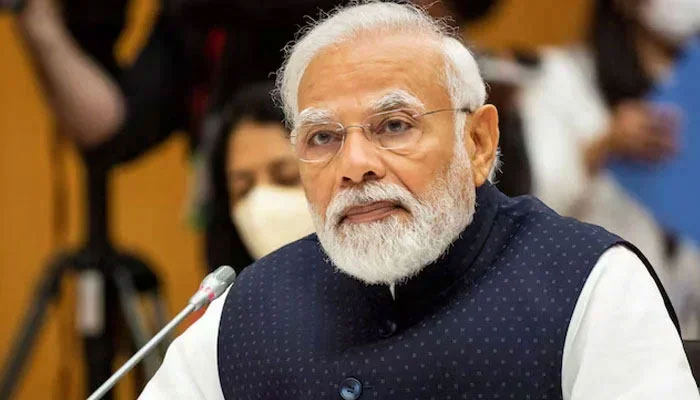India’s credibility crisis
Pakistani media’s restraint in reporting on Pahalgam incident has earned it praise even from its naysayers
In the aftermath of the Pahalgam attack in Occupied Jammu and Kashmir, the Indian government has chosen a familiar path: deflect, ban and censor. Rather than address the rather serious and inevitable questions that have cropped up about its internal security failures or the international scepticism surrounding its claims, India has turned its frustration outward – targeting Pakistani media, art, sport and journalism. This is a reaction not of strength, but of insecurity. On the recommendation of the Indian Ministry of Home Affairs, 16 Pakistani YouTube channels, including respected news outlets such as Geo News and prominent journalists like Asma Shirazi and Umar Cheema among others, have been banned for allegedly “spreading communally sensitive content and misinformation". In reality, their only fault seems to be responsible journalism and not subscribing to India’s state-approved narrative. This clampdown is a textbook example of authoritarian behaviour masquerading as national security. When the truth doesn’t align with a government’s agenda, censorship becomes its tool of choice.
Pakistani media’s restraint in reporting on the Pahalgam incident has earned it praise even from its naysayers. While Indian media whipped up hysteria and pointed fingers without evidence, Pakistani news outlets remained measured, mature and professional. This contrast in media conduct has not gone unnoticed. But the bans haven’t stopped at journalism. The cultural crackdown has reached Bollywood, with India reportedly blocking the release of Abir Gulaal, a movie starring Pakistani actor Fawad Khan. Despite anticipation around the film and its scheduled release on May 9, India has pulled two of its songs from YouTube and scrapped the film’s release altogether. The justification is again flimsy, echoing the same insecurity that drives censorship of news content. Even the world of sports has not been spared. BCCI Vice-President Rajeev Shukla has declared that India will not engage in any bilateral cricket with Pakistan following the Pahalgam attack – ignoring the fact that such matches haven’t occurred in over a decade anyway. When the ICC Champions Trophy 2025 was awarded to Pakistan, India still refused to play matches on Pakistani soil, forcing neutral venues. Instead of fostering peace through sport, India has always used cricket as a political weapon.
What these actions expose is not strength, but weakness – an acknowledgment that India’s global narrative is collapsing under the weight of its contradictions. Its media laments the lack of international traction on the Pahalgam attack. But the truth is simple: the international community does not buy India’s story because there is no credible evidence of Pakistani involvement. Major powers like the US, UK, EU, Russia and even regional players like China and Turkey have declined to echo New Delhi’s baseless accusations. The fact is that a country that has plotted assassinations abroad – in Canada, Pakistan and attempted ones in the US – cannot claim the moral high ground. A country exposed by Pakistan through irrefutable evidence, including the case of RAW agent Kulbhushan Jadhav, can no longer point fingers without answering hard questions itself. These bans, boycotts and blockades are the last throes of a state trying to shield itself from the truth. Rather than introspect, it punishes artists, silences journalists and isolates itself in sport. India needs to understand that silencing voices from Pakistan will not solve its credibility crisis.
-
 Michael B. Jordan Gives Credit To 'All My Children' For Shaping His Career: 'That Was My Education'
Michael B. Jordan Gives Credit To 'All My Children' For Shaping His Career: 'That Was My Education' -
 Sun Appears Spotless For First Time In Four Years, Scientists Report
Sun Appears Spotless For First Time In Four Years, Scientists Report -
 Bella Hadid Opens Up About 'invisible Illness'
Bella Hadid Opens Up About 'invisible Illness' -
 Lawyer Of Epstein Victims Speaks Out Directly To King Charles, Prince William, Kate Middleton
Lawyer Of Epstein Victims Speaks Out Directly To King Charles, Prince William, Kate Middleton -
 Microsoft CEO Shares How Gates Doubted $1bn OpenAI Investment
Microsoft CEO Shares How Gates Doubted $1bn OpenAI Investment -
 Milo Ventimiglia Calls Fatherhood 'pretty Wild Experience' As He Expects Second Baby With Wife Jarah Mariano
Milo Ventimiglia Calls Fatherhood 'pretty Wild Experience' As He Expects Second Baby With Wife Jarah Mariano -
 Chinese Scientists Unveil Advanced AI Model To Support Deep-space Exploration
Chinese Scientists Unveil Advanced AI Model To Support Deep-space Exploration -
 Anthropic’s New AI Tool Wipes Billions Off Cybersecurity Stocks
Anthropic’s New AI Tool Wipes Billions Off Cybersecurity Stocks -
 Trump Announces He Is Sending A Hospital Ship To Greenland Amid Rising Diplomatic Tensions
Trump Announces He Is Sending A Hospital Ship To Greenland Amid Rising Diplomatic Tensions -
 'Never Have I Ever' Star Maitreyi Ramakrishnan Lifts The Lid On How She Avoids Drama At Coffee Shops Due To Her Name
'Never Have I Ever' Star Maitreyi Ramakrishnan Lifts The Lid On How She Avoids Drama At Coffee Shops Due To Her Name -
 Inside Prince William’s Plans For Prince Harry: What Will Happen To Duke Once He’s King
Inside Prince William’s Plans For Prince Harry: What Will Happen To Duke Once He’s King -
 Chyler Leigh Pays Moving Homage To 'Grey’s Anatomy' Co-star Eric Dane: 'He Was Amazing'
Chyler Leigh Pays Moving Homage To 'Grey’s Anatomy' Co-star Eric Dane: 'He Was Amazing' -
 Did You Know Tech CEOs Limit Screen Time For Their Own Kids?
Did You Know Tech CEOs Limit Screen Time For Their Own Kids? -
 Matthew Lillard Admits Fashion Trends Are Not His 'forte'
Matthew Lillard Admits Fashion Trends Are Not His 'forte' -
 SpaceX Launches Another Batch Of Satellites From Cape Canaveral During Late-night Mission On Saturday
SpaceX Launches Another Batch Of Satellites From Cape Canaveral During Late-night Mission On Saturday -
 Princess Beatrice, Eugenie Get Pulled Into Parents’ Epstein Row: ‘At Least Stop Clinging!’
Princess Beatrice, Eugenie Get Pulled Into Parents’ Epstein Row: ‘At Least Stop Clinging!’




